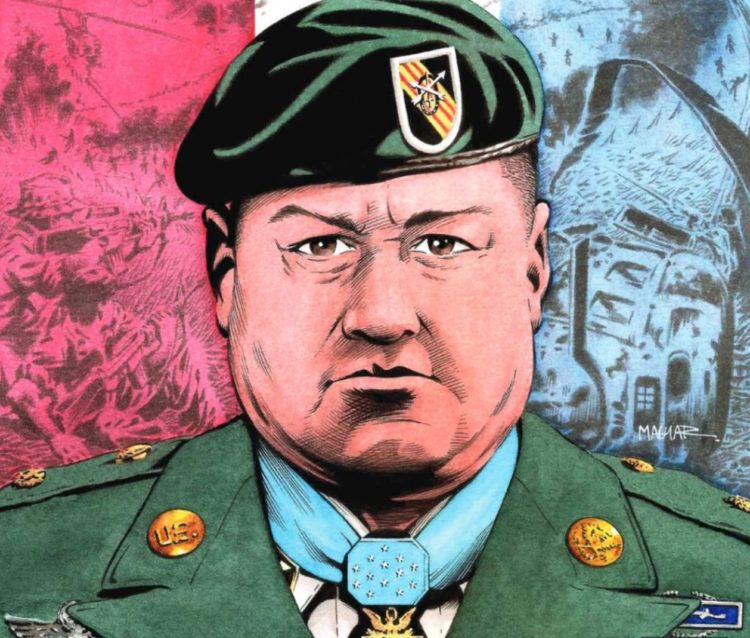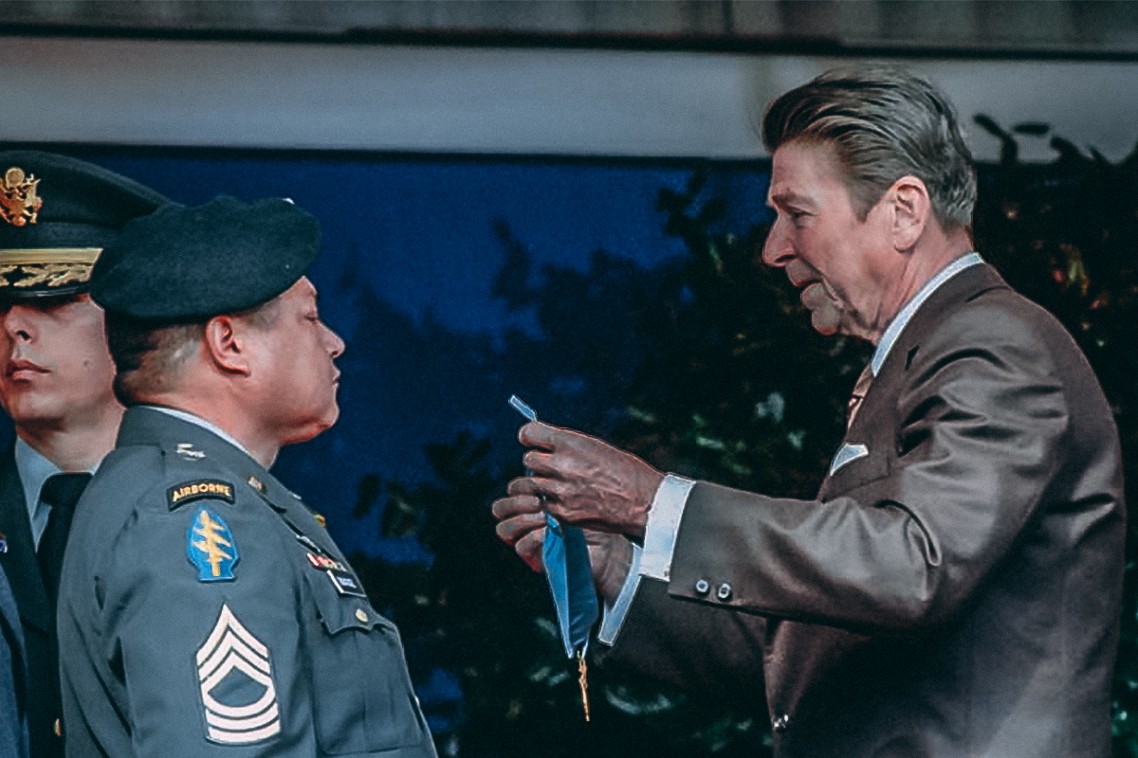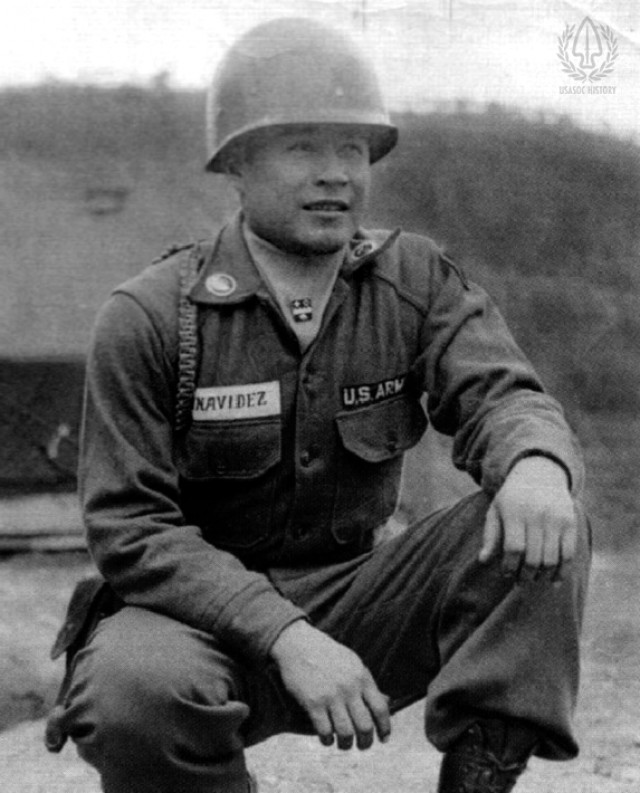Looking for a challenge, he became a member of the 5th Special Forces Group and the Studies and Observations Group (SOG). In 1965 he was sent to Vietnam as an advisor to an Army of the Republic of Vietnam regiment.
Tour One: Wounded
During a routine patrol, Roy Benavidez stepped on a land mine and had to be evacuated back to the United States. He ended up back in his home state of Texas at Brooke Army Medical Center (BAMC) in San Antonio
Doctors told the young soldier that he would never walk again. The military began to prepare his discharge papers.
Benavidez refused to accept this diagnosis and began his own unsanctioned nightly physical therapy sessions in an attempt to walk again. First, defying the doctor’s orders, he would crawl out of bed at night. Then, using his elbows and chin to drag himself to a nearby wall, he would do his best to try to stand up.
Eventually, he could prop himself up against the wall. His nightly sessions continued until he could wiggle his toes. Then, after a while, he could begin to move his feet. Finally, following several months of excruciating pain (which he admitted would sometimes be so great it brought him to tears), he could push himself up the wall using his ankles and legs
In July of 1966, after more than a year spent at BAMC, Benavidez walked out of the hospital, his wife at his side. Was he ready to take a medical retirement and go home? Hell no, he was determined to get back to combat in Vietnam.
Before long, his wish was granted, and, despite still being in a great deal of pain, he returned to combat operations in South Vietnam in January of 1968. At a time when the average soldier serving in Vietnam was 22, Benavidez was already pushing 33.
Tour Two: Welcome to Hell
On May 2nd, 1968, a 12 man Special Forces patrol was surrounded by an NVA infantry battalion of about 1,000 men. The team met with massive enemy resistance and requested emergency extraction.
Three helicopters attempted to get the soldiers out but could not land due to intense small arms and anti-aircraft fire. Sergeant Benavidez was at the FOB in Loc Ninh monitoring the operation by radio when the choppers returned to off-load wounded crewmembers and assess aircraft damage.
Benavidez voluntarily boarded a returning aircraft to assist in another extraction attempt. However, once he realized that all of the team members were either dead or wounded and unable to move to the pickup zone, he directed the helicopter to a nearby clearing, where he jumped from the aircraft as it was hovering. He then ran approximately 75 meters under heavy small arms fire to the team’s location.
On his way to the men, he was wounded in his right leg, face, and head. Yet, despite these injuries, he took charge and directed the team’s remaining members to shift their fire to facilitate landing an extraction aircraft that would load the wounded and dead.
He used smoke canisters to direct the aircraft to the team’s position. Benavidez, wounded and under intense enemy fire, carried or dragged half of the wounded team members to the aircraft. He next provided protective fire for that aircraft by running alongside it as it moved to pick up the remaining men.
He hurried to retrieve the body of the team’s dead leader and the classified documents he had on him. As he reached his body, Sergeant Benavidez was severely wounded by small arms fire to his abdomen and grenade shrapnel to his back.
At almost that exact moment, the helicopter pilot was mortally wounded, and the aircraft crashed into the jungle. Benavidez rushed to the wreckage and aided the wounded out of the overturned aircraft. Then, he placed the survivors into a defensive perimeter.
Despite the severity of his wounds and under heavy automatic weapons fire, the sergeant moved swiftly around the perimeter, providing the men with water, ammunition, and encouragement.
Benavidez next began to call in tactical air strikes and directed the fire of the gunships to suppress the actions of the enemy and permit yet another extraction attempt. However, just before another aircraft could land, he was wounded in the thigh by a small arms fire. This occurred while he was administering medical aid to a wounded team member.
Back to the FOB
And this brings us full circle to the point in the story, noted above, where Roy was clubbed in the head and ultimately exfiltrated, unconscious, back to the FOB.
To the men at the forward operating base, he appeared to be among the dead. At one point, someone took the initiative to put him in a body bag. Fortunately, while this was happening, a friend recognized him and called for help. A doctor came to examine Benavidez and, after looking at him, thought him to be dead. Two strikes.
As the doctor began to zip up the bag, Sergeant Benavidez summoned the strength to spit in the doctor’s face. The shocked physician removed him from the bag, and Benavidez was taken for emergency medical treatment.
He was found to have suffered 37 separate bullets, bayonet, and shrapnel wounds during the six-hour fight with the enemy battalion. Once stabilized enough to travel, Benavidez was evacuated once again back to the States to BAMC, where he eventually recovered.
Recognition and a Surprise Witness
Sergeant Roy Benavidez was awarded the Distinguished Service Cross (the second-highest award for extraordinary heroism under fire) and the Purple Heart.
After more details of his heroism came to be known, Special Forces Lieutenant Colonel Ralph R. Drake initiated the paperwork for Benavidez to be awarded the Medal of Honor.
However, by then, the time limit to award the medal had expired. An appeal to Congress for an exemption to the rule in his case was granted, but the Army Decorations Board denied the upgrade from the Distinguished Service Cross to the Medal of Honor.
The board requires an eyewitness account from someone present during the action. Benavidez believed there were no living witnesses. He didn’t know it at the time, but there was one man who lived and had witnessed his acts of heroism.
Brian O’Connor was a radioman on Benavidez’s team in Vietnam. He had been severely wounded during the fighting near Loc Ninh, and Benavidez believed him to be dead. It turns out he was evacuated back to the United States before he could be fully debriefed.
Fast forward to 1980, and Brian O’Connor is living in the Fiji Islands. He read a newspaper account of his former teammate’s actions in an Australian newspaper.
O’Conner immediately contacted Benavidez and submitted to the Army Decorations Board a detailed description of his eyewitness account. This was enough for them to upgrade Benavidez to the Medal of Honor.
President Reagan awarded him that medal in the Winter of 1981 in a ceremony at the White House.
Epilogue
Roy Benavidez passed away at the age of 63 at Brooke Army Medical Center from complications of diabetes, but not before helping hundreds of service members with their transition to becoming civilians again.
Roy was a surprisingly soft-spoken man and never took credit for being a hero. In fact, he’d always say,
“I am not a hero. The heroes are the ones who never came back. The heroes are the ones who are laying in their graves… the ones who gave up their tomorrows for our todays.”
But he was a hero, and his actions under fire will never be forgotten by the Special Forces community.












COMMENTS